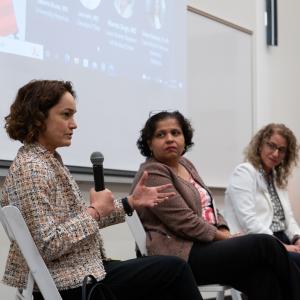The Clinical and Translational Science Collaborative (CTSC) at Case Western Reserve University aims to advance health equity, through translational science, with an emphasis on getting more treatments to all people more quickly. In pursuit of this mission, the CTSC prioritizes the importance of diversity in studies and trials within the scientific workforce, patient, and research participant populations. The CTSC also centers the goal of achieving equity in all of its efforts and initiatives by acknowledging that diversity, equity, inclusion, and accessibility are the building blocks for that achievement by fostering environments where diversity thrives, inclusion and accessibility are the culture, and equity is the outcome. The CTSC’s continued quest for understanding and remediating barriers to inclusion and access will guide and inform research programs and studies that reflect principles and values of DEIA.
One example of the CTSC’s commitment to DEIA is illustrated in their four-part interdisciplinary, multimedia challenge series titled the Mission: Health Equity Challenge Series focused on raising awareness about health disparities and the opportunity to use translational science to close preventable gaps in health outcomes. Researchers, clinicians, caregivers, community members, and Clinical and Translational Science Award hubs nationwide have participated in one or more of the challenges to date. The first challenge, a film screening of and panel discussion about The Color of Care, was made possible by a collaboration with the Western Reserve Historical Society, a Smithsonian Affiliate. The Color of Care is a documentary produced by the Smithsonian Channel and Oprah Winfrey’s HARPO Productions that amplifies the stories of Black and Brown communities and how the COVID-19 pandemic exacerbated existing health disparities. After co-hosting an in-person screening and panel discussion with the Western Reserve Historical Society, CTSC institutional partners Cleveland Clinic, MetroHealth, University Hospitals, and the Louis Stokes Cleveland VA Medical Center committed to hosting screenings and panel discussions, too.
“[…] there are 86 of us on this call. If each of us reaches five people and they reach five people and so on, we can touch and we can truly impact healthcare disparities in greater Cleveland very quickly—I did the math. That’s 67% of greater Cleveland. It’s really up to all of us,” Alan Nevel, Senior Vice President and Chief Equity Officer at MetroHealth, proclaimed during the first virtual screening and panel discussion in October.
As a result of the CTSC’s cross-institutional, collaborative efforts, Gelise Thomas, Assistant Director of Strategic DEI & Health Disparities in the CTSC, shared insights about the challenge series, translational science, and getting more people involved in research with WKYC Channel 3’s senior reporter and commentator, Leon Bibb, in a video segment titled We the People. We the People is a community engagement video series that features local organizations and initiatives.
-----
The Clinical and Translational Science Collaborative (CTSC), a collaborative among Case Western Reserve University (CWRU) and its affiliated hospital systems, Cleveland Clinic, MetroHealth, University Hospitals, and the Louis Stokes Cleveland Veterans Administration Medical Center, is a catalyst for high quality clinical and translational research both locally and nationally. The CTSC provides key services to investigators, trainees, and staff at CWRU and its collaborating institutions to facilitate clinical and translational research. The CTSC’s mission is to change the culture and environment of biomedical research, share resources and expertise, and streamline the research process to move translational research from bench to bedside and to the community. The CTSC is supported by the National Institutes of Health National Center for Advancing Translational Sciences through federal grants UL1TR002548, KL2TR002547, and TL1TR002549.


